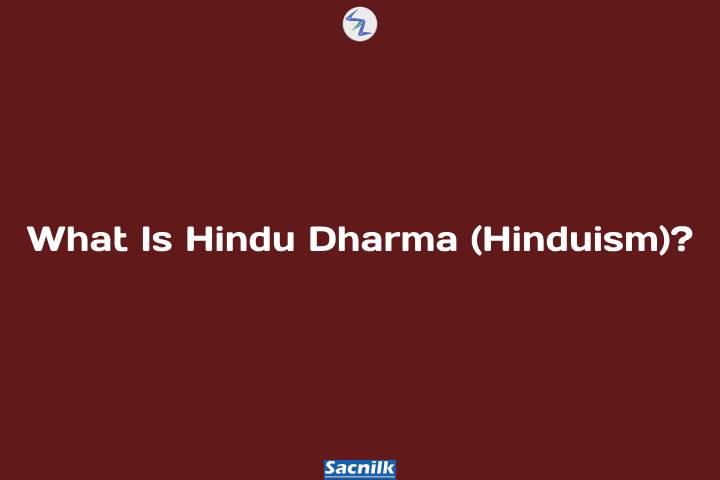What Is Hindu Dharma (Hinduism)?
Hindu Dharma, also known as Hinduism, is a complex and diverse religious tradition that has its roots in ancient India. It is considered to be one of the oldest religions in the world and has a vast array of beliefs, practices, and rituals.
At its core, Hindu Dharma is centered around the idea of karma, which is the belief that every action a person takes in their lifetime will have consequences in their future lives. The ultimate goal of Hinduism is to achieve liberation from the cycle of reincarnation and reach a state of spiritual enlightenment known as moksha.
Hinduism is a polytheistic religion, with a vast pantheon of gods and goddesses. The most important deities in Hinduism are Brahma, Vishnu, and Shiva. Brahma is the creator god, Vishnu is the preserver god, and Shiva is the destroyer god. These three deities are considered to be the trimurti, or the three aspects of the divine.
The central text of Hinduism is the Vedas, which is a collection of sacred texts that were passed down orally for centuries before being written down. The Vedas contain hymns, prayers, and rituals that are still used in Hindu worship today. The Upanishads, which are a collection of philosophical texts, also play a significant role in Hinduism.
Hinduism also has a strong tradition of guru-shishya (teacher-student) relationship. A guru is considered to be a spiritual guide who can lead one to enlightenment. The guru-shishya relationship is considered to be one of the most important relationships in Hinduism.
One of the most important practices in Hinduism is yoga, which is a system of physical and mental practices that are meant to help one achieve spiritual enlightenment. Yoga is considered to be a path to self-realization and is said to help one achieve a state of inner peace and tranquility.
Another important practice in Hinduism is puja, which is the act of worship. Puja can take many forms, such as offering flowers or food to a deity, performing rituals, or reciting mantras. The purpose of puja is to show devotion and respect to the deity being worshipped.
Hinduism also has a strong tradition of caste system. The caste system is a hierarchical system of social classes that is based on birth. The four main castes are the Brahmins (priests and scholars), Kshatriyas (warriors and rulers), Vaishyas (merchants and farmers), and Shudras (servants and manual labourers). The caste system is considered to be a way to maintain social order, but it has also been criticized for being discriminatory and oppressive.
In conclusion, Hindu Dharma is a complex and diverse religious tradition that has its roots in ancient India. It is centered around the idea of karma and the ultimate goal of achieving liberation from the cycle of reincarnation. Hinduism is a polytheistic religion with a vast pantheon of gods and goddesses, and its central text is the Vedas. The practices of yoga and puja are considered to be important in Hinduism, and the caste system is considered to be a way to maintain social order. Hinduism is a religion that is open to interpretation and has a strong tradition of guru-shishya relationship.
Stay tuned.
At its core, Hindu Dharma is centered around the idea of karma, which is the belief that every action a person takes in their lifetime will have consequences in their future lives. The ultimate goal of Hinduism is to achieve liberation from the cycle of reincarnation and reach a state of spiritual enlightenment known as moksha.
Hinduism is a polytheistic religion, with a vast pantheon of gods and goddesses. The most important deities in Hinduism are Brahma, Vishnu, and Shiva. Brahma is the creator god, Vishnu is the preserver god, and Shiva is the destroyer god. These three deities are considered to be the trimurti, or the three aspects of the divine.
The central text of Hinduism is the Vedas, which is a collection of sacred texts that were passed down orally for centuries before being written down. The Vedas contain hymns, prayers, and rituals that are still used in Hindu worship today. The Upanishads, which are a collection of philosophical texts, also play a significant role in Hinduism.
Hinduism also has a strong tradition of guru-shishya (teacher-student) relationship. A guru is considered to be a spiritual guide who can lead one to enlightenment. The guru-shishya relationship is considered to be one of the most important relationships in Hinduism.
One of the most important practices in Hinduism is yoga, which is a system of physical and mental practices that are meant to help one achieve spiritual enlightenment. Yoga is considered to be a path to self-realization and is said to help one achieve a state of inner peace and tranquility.
Another important practice in Hinduism is puja, which is the act of worship. Puja can take many forms, such as offering flowers or food to a deity, performing rituals, or reciting mantras. The purpose of puja is to show devotion and respect to the deity being worshipped.
Hinduism also has a strong tradition of caste system. The caste system is a hierarchical system of social classes that is based on birth. The four main castes are the Brahmins (priests and scholars), Kshatriyas (warriors and rulers), Vaishyas (merchants and farmers), and Shudras (servants and manual labourers). The caste system is considered to be a way to maintain social order, but it has also been criticized for being discriminatory and oppressive.
In conclusion, Hindu Dharma is a complex and diverse religious tradition that has its roots in ancient India. It is centered around the idea of karma and the ultimate goal of achieving liberation from the cycle of reincarnation. Hinduism is a polytheistic religion with a vast pantheon of gods and goddesses, and its central text is the Vedas. The practices of yoga and puja are considered to be important in Hinduism, and the caste system is considered to be a way to maintain social order. Hinduism is a religion that is open to interpretation and has a strong tradition of guru-shishya relationship.
Stay tuned.
Comments
Write Your Comment Here
Max comment length: 100 words; Please don't use bad language otherwise your comment will be removed
Related News
Trending News
Entertainment
Big NewsQuick News
Recent News
Recent Movies
Upcoming Movies
Upcoming Birthdays
Recent Songs
Recent Movies Collection
Sports
Politics
Sports
Internet
India
Education
FeedbackAbout
Contact Us
T&C
Privacy Policy
Cancellation/Refund Policy
Are you a writer/blogger, Work with Us
© Sacnilk Technologies Pvt. Ltd. All Rights Reserved


 Knowledge
Knowledge Knowledge
Knowledge